News and views from our community
-

Choosing the right aged care mobility device for you
As we age, maintaining mobility becomes crucial for preserving independence and overall well-being. Whether you are in your senior years or assisting an elderly loved one, selecting the right mobility device is essential. Here’s a brief overview of some popular options along with some tips for choosing the perfect fit.Walking sticks (canes)Walking sticks or canes, are simple aids to provide stability and support while walking. They are ideal for mild balance issues or occasional support.Features to consider include:Handle type – there are a variety of handles on offer in the marketplace, including crook, swan neck and derby (see illustration below).Make sure to choose the handle that best suits you and your mobility needs. Crook handle walking sticks are easy to carry, like an umbrella, whereas swan neck options provide a stronger grip and keeps your weight centred. Derby handles may be better if you are looking for a bit of added support, for example, if you easily become unbalanced while walking.Material – aluminium canes are light weight and are often height adjustable and foldable. Wooden walking sticks have a more traditional style and feel and may appeal to those who appreciate a more heritage look.Base – a quad base (as displayed on the swan neck walking stick in the illustration above) provides more stability and security for those who suffer with balance issues. They offer four rubber ends to stabilise the walking stick but may not suit those who regularly climb stairs (as the wide base may not fit onto steps).Walkers (walking frames)Walkers provide more stability than canes as they have a larger frame to stabilise movement. If you have moderate mobility challenges and/or are recovering from an injury, a walker may be a better choice for you. Many also come with a built-in seat, allowing seniors to take a moment to rest when needed.Features to consider include:Base configuration – choose between standard (four rubber tipped legs), two wheel or four-wheel walkers. A standard walker provides the most stability, but the user must lift the walker to move it, so some arm strength is required. A two wheel base may be appropriate if you have trouble lifting a standard walker. A four-wheel walker may be more appropriate for those wanting a continuous gait, as there is no need to lift the frame. They have hand brakes fitted to the frame, which helps control speed, so some dexterity is required to use them. Four-wheel walkers may be better for those who only need to lightly balance themselves during walkingFoldability – check ease of folding the walker down and back up again for easy storage and transport.Weight capacity – ensure the walker can support the user’s weight.Mobility scootersElectric mobility scooters offer convenience and independence and are perfect for seniors wanting to travel longer distances, particularly outdoors.Features to consider include:Safe operation – operating a mobility scooter requires the user to be confident in their ability to safely control the vehicle. This requires a degree of concentration, adequate vision, balance (particularly on sloped surfaces), good hearing to be aware of your surroundings and the ability to get on and off the scooter without too much exertion.Operating range – the operating range of mobility scooters can vary. Some small scooters can travel up to 20km depending on the model and may be better suited to those who only want to travel short distances, for example, around the local shopping centre. At the opposite end of the scale, heavy duty scooters may operate at distances up to 50km, depending on the model, and may be better suited to rougher terrain. It’s important to think carefully about how you intend to use the mobility scooter and across which surfaces before deciding on a model.Comfort – check the seat comfort and leg room. Think about your own physical attributes – people who are taller or have a larger frame may require something a bit larger to accommodate their needs.If you are living in Victoria, you may like to consult VicRoads Guide to Choosing and Using Mobility Scooters and Powered Wheelchairs for more information.Remember to consult with a healthcare professional or occupational therapist to make an informed decision about the right mobility device for you. The right mobility device depends on your own individual needs, lifestyle and preferences. By taking the time to consult with professionals who have your interests at heart, you can look forward to enhanced mobility and a higher quality of life.
- 08 May 2024
-
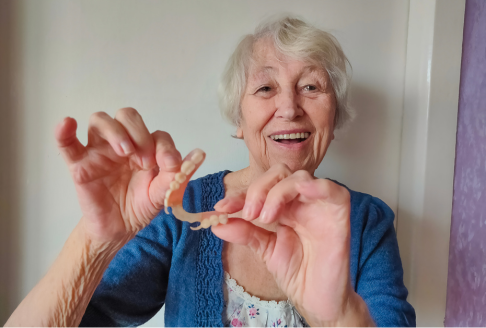
Food tips for people with dentures
If you have dentures, you may feel apprehensive about eating some of your favourite foods, especially if they are chewy or require you to bite into them.Here’s some tips to help you make the transition to eating with dentures easier. From some ideas for softer options to how to manage a gradual re-introduction to solid foods – we’ve got you covered.Ease into solid foodsTake some time to get used to your new dentures and avoid rushing back into eating solid food straightaway. Start with softer food options and build your confidence before trying your favourite solid foods.Eat healthy, soft foodsWhile it’s easy to feel overwhelmed by the list of foods you can’t eat when wearing dentures, it’s important to remember there are a lot of healthy and soft options you can still enjoy. For example:Soft, ripe fruit (bananas, mangoes, oranges, etc.)Steamed, boiled or roasted vegetables (broccoli, carrots, zucchini, sweet potatoes, etc.)Slow cooked or mince meats (ground beef, chicken, turkey, etc.)Smooth spreads and dips (hummus, cream cheese, guacamole, etc.)Other soft foods you might like to eat include scrambled eggs, soups, broths and smoothies.Exercise caution with hot foods and drinksKeep in mind that hot foods and drinks can burn your mouth more easily when you have dentures because dentures can hinder your ability to gauge temperature effectively. Try to test the food or drink against your lips first, before you take a bite or sip.Cut up your food and take small bitesTo avoid putting excessive pressure on your dentures, cut up your food into smaller pieces. Taking small bites also helps distribute the force evenly and prevents discomfort. Chew slowly and deliberately across both sides of your mouth.Some things to avoid …Sticky hard foods like toffees, caramels, marshmallows, peanut butter and raisins can adhere to your dentures and dislodge them. Be careful with nuts and ice cubes which can put stress on your dentures and potentially cause damage to them.Some last quick tipsAvoid using your front teeth to bite into food. Instead, focus on cutting up food into smaller pieces which you can put directly into your mouth, using your back teeth to chew.Remember, proper care and maintenance of your dentures is essential to their longevity. Regularly clean them, remove them at night and visit your dental professional for adjustments and further advice as needed.
- 30 Apr 2024
-
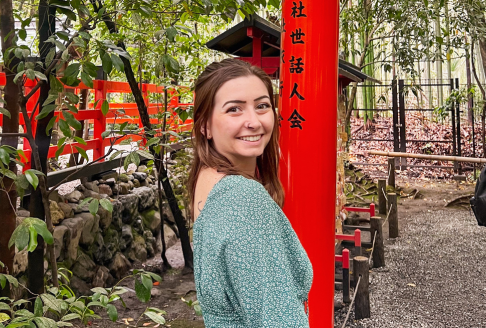
Meet Erin Macdonald
Meet Erin Macdonald, one of our talented Baptcare Allied Health team members. Erin works as a Diversional Therapist, supporting our Home Care clients’ wellbeing through tailored leisure and recreation-based interventions. She’s also part of an award-winning team, recently recognised by Baptcare for their exceptional performance on the front lines of care.Read on to discover more about Erin’s work in Diversional Therapy, her views on what helps create a high performing team and of course, why she loves working at Baptcare.When did you start working at Baptcare?I started working at Baptcare in December of 2022, about a month after I arrived in Australia from Canada.What does a Diversional Therapist do?As a Diversional Therapist, I work to keep people engaged and busy in their day to day lives. I focus on social, cognitive, physical, spiritual domains and help people engage and stay connected with areas of current or previous interest. I focus on helping people reconnect with previous hobbies or assist them with starting new hobbies that would offer various benefits to them. A collective goal as a Diversional Therapist is to increase and maintain clients’ quality of life. How did you train to be a Diversional Therapist?For me the process was probably slightly different than somebody who trained in Australia. In Canada, my speciality is titled ‘Recreation Therapist’. I went to college for two years, and obtained a diploma in Therapeutic Recreation, and then went on to University where I obtained an Undergraduate degree in Recreation and Leisure studies with a major in Therapeutic Recreation. What kind of personal qualities are needed to do this job well?Empathy and kindness play a huge part in this job. To be able to help people improve their quality of life, it is super helpful to be able to understand how they feel and to be able to put yourself in their shoes. Additionally, being friendly and outgoing really allows you to connect with individual clients and encourages them to feel comfortable around you. What is a typical day at work like for you (if there is such a thing as a ‘typical day’)?Most days are similar, but also very different. I work in Home Care so I typically see clients daily whether it is for an initial assessment, or a follow up home visit to continue implementing the recommendations and action plan that is curated during the initial assessment. I also have a high volume of behind the scenes work that includes researching supplies for specific clients or connecting with community centres on clients’ behalf. You are part of a team who recently won a Baptcare We Care Values and Safety Star Award for Co-Creation – congratulations! Tell us, reflecting on the team you are in – what are the key qualities that drive excellence there?Having the motivation to meet and exceed the needs of clients, and being able to work together effectively as an inter-disciplinary team that has the same goal for our clients’ needs, are both important qualities to have a positive client outcome. Everyone works together in so many ways - whether it is suggesting referrals for different team members or communicating about clients that we see. Have you always worked in the aged care industry?Yes, I have mainly always worked in aged care, Most of my experience has been in Dementia Specific Aged Care facilities but I have also worked in outpatient mental health and day programs for adults with various disabilities. I have always enjoyed working in the aged care industry. Why do you like working at Baptcare?Baptcare has such a supportive team environment, which is an environment I find easiest to thrive in. Everybody is very supportive of one another. I also really enjoy the flexibility, and work life balance the company promotes. What do you enjoy doing in your time away for the office? Any hobbies or other interests you’d like to share?I spend most of my free time outdoors, I love hiking, camping, beach days - anything that gets me outside. I have also recently become interested in photography and started pursuing that hobby which I have really enjoyed.In the winter I snowboard frequently which is the hobby I am most passionate about - I am a winter lover for that reason. What is your motto in life?I live by the belief of trusting in timing and that life is shorter than you think - live it to the best of your desires. If you could sit down and have dinner with anyone (living or not) who would it be and why?If I had the option, I would love to have dinner with my grandmother - she passed away when I was a toddler and I would love to be able to have a dinner and conversation with her. The stories I have heard have led me to believe she was an incredible woman - and I would love to hear those stories firsthand.Please complete this sentence …” My perfect weekend would include ….”A perfect weekend for me would include going on a day road trip out of the city (I love exploring new areas) going to a local market, finding a nice hike and spending time laughing with friends. Thank you, Erin, for your outstanding contributions to our clients’ care. We deeply appreciate everything you and your fellow team members do to enrich our community.If you are interested in working at Baptcare and joining a great community of supportive colleagues dedicated to the health and wellbeing of our clients, click here to learn more about our career options.
- 23 Apr 2024
-

Australian Home Medicines Review | Empowering better health
The Home Medicines Review program, administered by the Australian Government Department of Health and Aged Care, plays a key role in ensuring the safe use of medicines at home.The program involves an accredited pharmacist visiting you at home to check that you are taking your medicines correctly and that they are working for you. The pharmacist will work with you to ensure that you are receiving the right medicines at the right dose for your condition. They will also help identify any potential drug interactions and advise on any dosage adjustment and simplifications to your medication review.You may want to ask for a Home Medicines Review if you take a lot of different medicine, visit different doctors to obtain prescriptions, are feeling unwell on your medication or are struggling to remember to take your dose at the right time.How do I get a Home Medicines review?Your doctor can assess your eligibility for a Home Medicine Review, so the first step is to make an appointment with your General Practitioner (GP). If your doctor agrees that you would benefit from a Home Medicines Review, they will write a referral to an accredited pharmacist.While there is no cost for a Home Medicines Review, you may need to pay for your GP visit, unless they are a bulk billing clinic.Preparing for a Home Medicines ReviewBefore the pharmacist arrives, take stock of all the medicines you are taking. This should include prescribed medication, over the counter medicines (e.g., pain relief, eye and ear drops, etc.) as well as any vitamins or other supplements.What happens during the Home Medicines Review?The pharmacist will visit you at home and ask you questions about all the medicines, vitamins and supplements you are taking.They will assess the safety of your medicines by checking that they haven’t passed their expiry dates and are being stored correctly. The pharmacist will ask you questions about how you are taking the medicines and suggest ways to help you remember to take them at the right times.What happens after the Home Medicines Review?After speaking with you, the pharmacist will write up a report and send it to your doctor. You can make an appointment with your doctor to discuss the report findings. Your doctor will write up a plan for you to help better manage your medicines, including changes to your medicines, if needed. This is known as a ‘Medication Management Plan’.Where can I get more information about the Home Medicines Review program?For more information, visit the Home Medicines Review website or speak with your GP.Remember: knowledge is the best prescription for well-being. So, if you are feeling concerned about your medication, don’t hesitate to reach out for advice.
- 18 Apr 2024
-
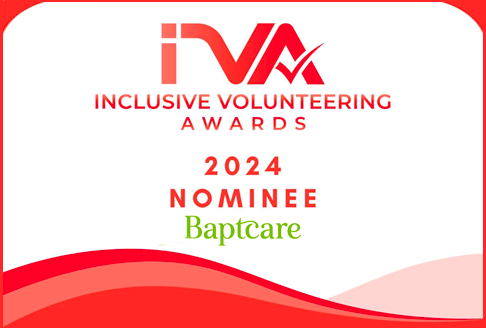
Baptcare recognised for our inclusive volunteering program
We are thrilled to share that Baptcare has been nominated for an Inclusive Volunteering Program award in the 2024 EV Strengthening Communities Inclusive Volunteering Awards. These awards acknowledge and celebrate organisations whose volunteering programs welcome volunteers from all walks of life.Baptcare received the following acknowledgment of such inclusivity in our nomination application. “The Baptcare volunteer program team acknowledges, celebrates, and recognises the efforts of students, migrants, First Nations and the culturally and linguistically diverse (CALD) community and the strengths they bring to the 24 programs they offer”.“Inclusivity is at the heart of our Baptcare values and volunteering mission, as supported by our workforce data. Last year, we had an increase in diversity hires by more than 120 people,” said Baptcare Volunteer Program Partner, Lana Davis.“I’m so proud of Baptcare’s fair, equitable and inclusive practices in our recruitment, engagement and management of volunteers and the feedback we receive from our volunteers that they feel safe, supported and empowered in their volunteering journey with us,” she said.“I've heard many stories from our migrant volunteers on their inability to obtain work in Australia despite being highly skilled with university degrees. We are proud our inclusive practices, pathways to employment options and wellbeing programs have attracted our wonderful community of volunteers,” said Lana.Congratulations to all the volunteer team and community. Fingers crossed for some good news on 1 May at the awards ceremony!Find out how to join our fabulous volunteering community here.
- 12 Apr 2024
-
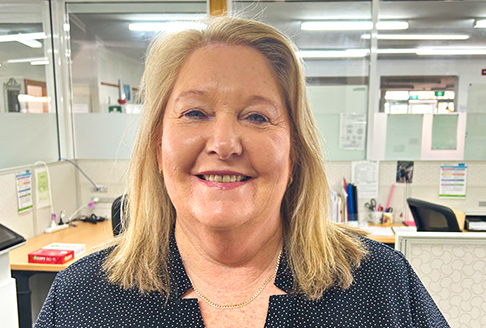
Meet Robyn Jones
Visiting Baptcare’s Orana Respite Day and Social Centre in East Devonport, Tasmania is like walking into a cosy relative’s home. You’re greeted by the smell of a hearty hot meal and everyone seems genuinely happy and relaxed from the chatty clients to the various lifestyle and kitchen staff. Overseeing the happiness is Robyn Jones, Home Care Program Manager at Orana who is often seen quietly interacting in the background with her trademark composition and kindness. A quote from Sheryl Sandberg (Former Chief Operating Officer of Facebook) comes to mind: “Leadership is making others better as a result of your presence …”What is your current role and what does it involve day to day? I am the Home Care (HC) Program Manager at Orana. As we are such a tightknit and supportive team at Orana, my days can vary depending on what’s needed at the centre. For example, it may involve supporting staff to resolve tricky situations within our budgetary requirements or it may involve filling in for someone in the social centre (which I love as I get to chat to all our beautiful clients!) Overall, my role is to ensure we have happy clients and staff and that everyone is working to the best of their ability to provide the best possible support to our clients in the Day Centre and/or clients in their own homes in the community.How long have you been working at Baptcare and how long at Orana?I have been working for Baptcare for over five years. I started in the National Disability Insurance Scheme (NDIS) space as Regional Manager in Launceston then moved over to Devonport in 2021 to manage our HC services which is where my passion lies.What do you like about working with Baptcare and at Orana? Baptcare have been very supportive to me over the years and have given me opportunities to work in different areas of the business. I love working at Orana as I love HC. I genuinely love working with all our clients in the Day Centre and in their own homes. I love making a difference in their lives and if I can make a client happy by bantering with them or giving them a solution to their problem then I go home, knowing I have made a small difference to someone. The staff I work with daily are also amazing. I can put my hand on my heart and say they are the best team I’ve ever worked with and I have been in the HC sector for over 30 years so that’s really saying something!Can you share a particularly special workday or customer interaction you’ve had recently? We had the pleasure of having our CEO, Geraldine Lannon, and her team visit Orana late last year. During this visit, we had some of our clients interviewed by the media team. To hear the laughter and the stories on this day made me so proud to work at Baptcare and to work with such beautiful people.How would you sum up Orana? Why do you think it’s such a special place for so many people? Orana is a special place because of the staff who run our Day Centre and all the staff who provide support to our clients. And then there’s our cook who is also amazing! We give our clients the opportunity to meet new people and form new friendships. A group of our clients even chose to go on a cruise together recently! No matter which Orana staff member answers a phone call, I know that the person will always be greeted with a happy voice. We make our clients feel welcome so they know Orana is a safe place for them. The feedback we receive from the community and clients is that our care workers are like their additional family. Our low staff levels speaks volumes.Are there any common experiences you notice with your customers? Are they generally a bit shy when they first join Orana? What kinds of comments do they make about Orana? Most new clients are in two minds when coming for the first time as they don’t know anyone. We make sure that we sit all the new clients with longstanding clients who are very sociable. I often see our current clients get up and go introduce themselves and welcome the new clients to Orana, which makes them feel special. We make sure that we include our new clients in conversations and encourage them to stay on for activities after lunch. It is very rare that a new client doesn’t return to Orana. We often hear clients say that they wish that they’d come to Orana earlier; that they love it here, that Orana is like their second family and even that it has saved their life.And now a bit about you, Robyn. Did you always want to work within the aged care space and what are some other jobs you’ve performed in your career? With the exception of a small stint at Baptcare in the NDIS space, I have always worked in aged care. When my children were little and at school, I worked in a residential kitchen where I would help prepare and deliver the meals to residents in the dining room. I enjoyed listening to their stories and enjoyed my job so much that I put myself through study for my Certificate III in Aged and Community Care. Once I achieved this, I started working in home care and have never looked back. I continued with my study and was given opportunities through my career to go into other positions. I have had over 10 roles within the home care space so feel I have done it all. I like to share my career story with others to encourage them to set goals and know that you can achieve whatever goals you set your mind to.What did you want to be when you grew up?I thought I would work in childcare but my career path changed when I accepted an opportunity in a residential aged care community. I have never regretted that decision.Can you tell us two surprising things about yourself? Five months ago, I joined a dragon boat paddling group that’s made up of breast cancer survivors and supporters of breast cancer. I had never paddled in my life, but I love it and have made some wonderful friends. I have three sons, four granddaughters and one grandson who mean the world to me. People describe me as a very strong person but one of the hardest things that I’ve had to face in my life was moving away from them. Thank goodness for technology and Facetime!Do you have a favourite quote or motto in life? Life is short so don’t put off what you can do today.Please complete this question: my favourite weekend would include going away for the weekend. Tasmania have so many beautiful places that are only a couple of hours drive away. Going away helps me recharge my batteries for the week ahead. What are two things on your bucket list? Visit the UK and meet family I haven’t met but are friends on Facebook.Visit Canada for a white Christmas.Do you have a mentor or idol? OR If you could sit next to someone at a dinner party, who would it be and why? If I was to sit at a table with someone of my choice, it would be Hugh Jackman. He seems like a down to earth person.You can read more about our Orana community on our website.
- 10 Apr 2024
-
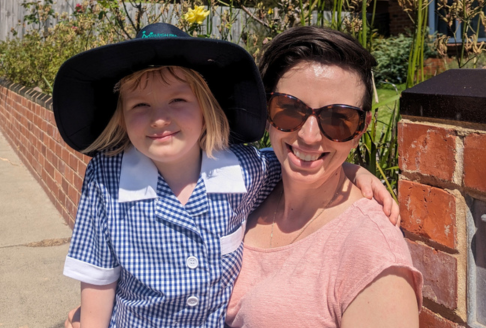
New Beginnings reflection by Cathy Taylor, Spiritual Care Coordinator
We asked Cathy to write a piece on the theme ‘new beginnings’ for the first internal Baptcare newsletter for 2024. Here is her thoughtful piece.Every moment offers a chance for a new beginning. Each breath holds a new opportunity to be grateful. Though we mark a date on the calendar when a new year begins, if we see each day as a gift, then there is always an opportunity to start again, to start afresh.In the morning, we can choose to be mindful and appreciate the first conscious breath we take as our eyes flutter open. We can feel the coolness or warmth of the air as we step outside the house. Another new moment. It’s the little moments like these that I encourage my clients to reflect on. The spiritual practice of gratitude: noticing what they can be grateful for in their day. We often rush through our days. It is the small moments that make up our lives, moment by moment by moment.This year my daughter began primary school. We live within walking distance, and that walk to and from school is enjoyable for us both. I must admit some mornings we rush out the door, walking at a pace where we are unable to slow down! Most mornings though, we stop, and literally smell the roses. Breathing in their delightful aroma, exquisite. My daughter notices a feather, or a dragon-shaped cloud in the sky. We listen to the magpies sing, we sing back. These moments, the little moments, make up life.Each moment we have a choice, each moment a new opportunity, to begin again.You can learn more about Spiritual Care at Baptcare here.
- 04 Apr 2024
-
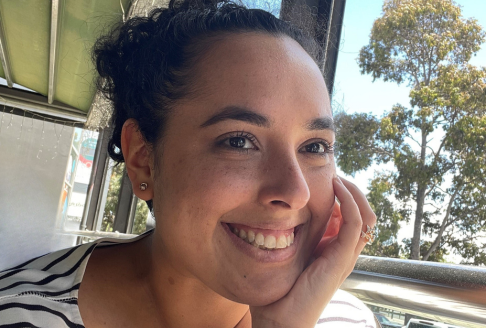
Meet Isabelle Oehler
Isabelle Oehler is a Consultant in our Customer Enquiry Centre. She builds immediate rapport with members of the public and Baptcare customers who ring in with queries or concerns.“Isabelle brings a positive and inclusive energy to our team, doing her best to make everyone feel valued and seen,” says her team leader, Jamie Waiariki.Read on to find out what Isabelle likes about her job, the thinking behind her choice of three dream dinner companions, and why the resurgence of Crocs as a fashion item did not come as a surprise…Isabelle, what does a good day at work look like for you?A good work day includes have a laugh with the customers on the phone, enjoying their conversations and have those satisfying interactions explaining the difference between CHSP and HCP.Which of Baptcare’s WECARE values (Wellbeing, Ethics, Co-creating, Accountability, Respect, Effectiveness) resonate most with you? Wellbeing and Respect. I believe these two values go hand to hand.What sort of work did you do before joining Baptcare?I worked predominantly in retail and at a café as a barista/waitress. However, I have studied Media and Communication, have had the opportunity to work in Public Relations/Event Management and volunteered with various events that help those in need.One of your retail jobs was at the Crocs store in Richmond. Be honest: have you been surprised by the recent resurgence of Crocs as a fashion item?Actually no. With the different collaborations that Crocs have done over the years with other brands such as Hello Kitty they have caught the attention outside of their target market. Therefore, not only are they cute and fun but also provide comfort and practical uses.Now we can see how great you must have been in retail! What did you want to be when you grew up? An artist. I love arts and crafts.Can you tell us something surprising about yourself?My guilty pleasure is reality tv.What is your go-to karaoke song?Whitney Houston, ‘I will always love you’.Do you have a favourite quote or motto in life?Look good, feel good. If you could have dinner with any three people, who would they be?Joe Brumm, Michael Dante DiMartino and Bryan Konietzko. Joe Brumm is the creator of ‘Bluey’ and Michael Dante DiMartino and Bryan Konietzko are the creators of ‘Avatar: The Last Airbender’. I believe both shows are ridiculously smart in their own right. I would love to chat to them about their journey through production, storylines, concept and so on.What do you like most about working at Baptcare?I like working with my team. Everyone is supportive, respectful and understanding. How would your friends describe you?Confident, loving and caring.What would a perfect weekend look like for you?Staying near the beach, watching anime and reality tv, and eating all my favourite food.Lastly, what IS the difference between CHSP and HCP?So glad you asked! It relates to the level of support that you receive from the provider. CHSP (Commonwealth Home Support Program) is the entry-level of support for customers while HCP (Home Care Package) is for customers who have more complex needs. We are always happy to talk people through this, because it can be confusing. We want to make things as clear as we can and help people get the level of support they require.
- 02 Apr 2024
-

An Easter reflection — by Asher Kirby, Spiritual Care Supervisor, Residential Aged Care
One of my favourite Easter traditions is the Easter Egg Hunt. In my extended family gatherings, the young children are sent into the garden in the afternoon to find hidden chocolate eggs. One year, the egg hiders decided to save time by hiding the eggs early in the day. As the grandchildren ran around discovering lovely shiny foil-wrapped packages, we quickly realised that the day was hotter than anticipated, so the children were collecting foil-wrapped pools of melted chocolate! I love Easter for the holidays, celebrations and traditions (even when they don't go quite as planned). I also love it for the meaning it holds for me as a Christian — the story of the death and resurrection of Jesus. I draw deep meaning from this story, but I also draw meaning from the themes I see in the Easter events that I believe are common to us all. For Christians, Good Friday is a day associated with grief, loss and uncertainty about the future, because it remembers the unexpected death of Jesus. We can all identify with the loss of a loved one, or grief over some aspect of life that has not gone the way we expected it to. We know the feeling of being unsure about the future, and we reach out to others for support. Easter Sunday, by contrast, is for Christians a day connected with hope, celebration and new life, as it commemorates the resurrection of Jesus. For most of us, we can easily identify with these feelings of celebration and new life. We look for hope in our relationships and our work, and we offer hope to one another when we bring all of who we are into those spaces. While each of our experiences is unique, there is commonality in the journey we are on. This Easter, may you find hope and celebration as you go through the weekend, even amidst any grief or uncertainty you are carrying. (And if chocolate eggs are your thing — may yours be non-melted and delicious!)
- 25 Mar 2024
